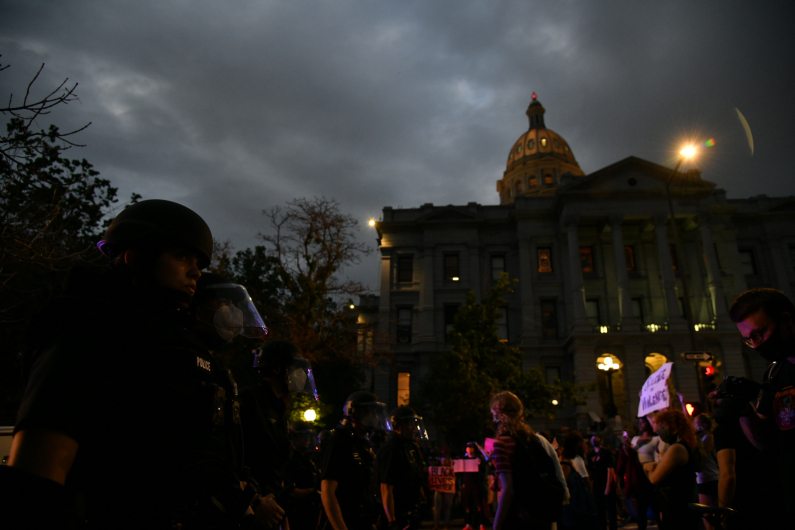
Gov. Jared Polis has said he will sign the bill
Officials in Denver, Colorado are using their swift actions to show their concern for the current climate we’re facing as nation and other cities could use this example to start to follow suit.
By Saja Hindi
Colorado passed one of the most comprehensive police reform packages in the country Saturday, setting limits on police use of force and mandating data collection to make sure cops who are fired from one agency don’t get rehired by another.
Gov. Jared Polis has said he will sign the historic bill into law once it reaches his desk.
“This is, in my estimation, the largest single advancement of individual civil rights and liberties for Coloradans in a generation,” said Denver civil rights attorney Qusair Mohamedbhai.
Among the biggest changes, Colorado’s Senate Bill 217 bans the use of chokeholds and carotid control holds, limits when police are allowed to shoot at a fleeing person and requires officers to intervene in cases of excessive force or face criminal charges. The bill requires all officers to use body-worn cameras and departments to release the footage within 45 days, and it allows for officers to be held personally liable for civil rights violations. TOP ARTICLES1/5READ MOREHouse Democrats’ climate plan would endgreenhouse gas emissions by 2050
The final vote in the state Senate on Saturday afternoon puts Colorado at the forefront in adopting a statewide approach to systemic policing changes following protests over George Floyd’s death at the hands of Minneapolis police less than three weeks ago. The Iowa governor signed a similar but less broad bill Friday that bans chokeholds, collects data on use of force and prevents officers who get fired from getting rehired at other agencies. New York also passed a package of bills for police reform this week. The reforms aim to implement these changes in policing and put an end to the disproportionate killings of black and brown people.
“Colorado is leading the way. We led the way when it came to gun safety reform measures, and we’re leading the way now when it comes to police reform measures,” said Sen. Rhonda Fields, D-Aurora, and a bill sponsor.
Across the country, many changes are coming at the city level. City Council members in Minneapolis voted to dismantle the police department, and the Los Angeles mayor announced a decision to move money from policing to other services.
Colorado politics from city hall to the halls of Congress, sent every Thursday.SUBSCRIBEBy signing up you are agreeing to our Privacy Policy and our Terms of Use
“It’s bold, and in some areas, it will be a leader, and in other areas, it’s standing in line with other states,” Maes said.
One of the biggest wins for supporters of Colorado’s bill — and most contentious for opponents — was the removal of the qualified immunity doctrine. That means victims or their families can sue police officers in their individual capacities for constitutional violations and those officers can be held personally liable.
A similar provision is in federal legislation introduced to address police brutality.
Another major part of Colorado’s bill is the change in the state’s “reasonable officer” standard. The bill details more objective standards for when officers are allowed to use deadly force: during an arrest if they or others are facing an imminent threat. They would not be allowed to use deadly force to stop someone who is suspected of a minor or nonviolent offense.
“I expect that we will see states move pretty quickly to some of the reforms similar to what Colorado is doing,” said Justin Nix, associate professor of criminology and criminal justice at the University of Nebraska at Omaha.
Nix, whose research focuses on police use of force and culture, said he applauds Colorado’s quick, decisive action and believes that it’s a good thing, but he also cautions against states moving too fast. Governors should already be thinking about and discussing this type of legislation, he said.
Some parts of Colorado’s Senate Bill 217 were modeled after other states. Democratic Rep. Leslie Herod of Denver and Senate President Leroy Garcia of Pueblo said they incorporated parts of what other states are doing but also took into account the Colorado’s unique needs.
The bill will put Colorado in company with at least 23 other states that already require the release of officers’ body-worn camera footage upon request. The state also will join a handful of states that are improving data collection, Nix said. The Colorado bill requires local agencies to report on all use-of-force incidents, not just those that are deadly. The information will go into a statewide database.
Nix echoes the advice of other policing experts around the country: “The level of government that’s best suited to reform police right now is the state government.”
When it’s left up to individual police chiefs, he said, there’s a lot of variation in what they believe should be released — and that’s not fair to the public.
The road to this point has been a long one. Colorado has passed criminal justice reforms over the years but nothing as far-reaching in one fell swoop. The momentum of the Black Lives Matter movement after Floyd’s death motivated lawmakers, including Republicans who may have been opposed to such reforms in the past. The bill, sponsored by every Democrat in Colorado’s legislature, ultimately received bipartisan support. The final vote in the House was 52-13 on Friday, and in the Senate it was 32-2 on Saturday.
“We want accountability, we want transparency, and we got what we asked for,” Republican Sen. John Cooke, a former Weld County sheriff, said Saturday in support of the bill.
Law enforcement groups have also been part of the process.
“Many of the policies included in Senate Bill 217 are already in place at the local level, but we are glad to have statutory support for changes that law enforcement can implement uniformly statewide,” Broomfield Police Chief Gary Creager, the chair of the Colorado Association of Chiefs of Police, said in a statement. “We look forward to continued partnership with our communities and the Legislature to ensure policing in Colorado is transparent and fair.”

While sponsors had hoped to get bipartisan support, the amount of it surpassed what they expected. Just a few months ago, Herod said, she was approached by the family members of 19-year-old De’Von Bailey seeking changes to policing in the state. Bailey, a black man, was fatally shot in the back by Colorado Springs police last December while fleeing from officers who were responding to a call about an alleged armed robbery.
She said she had to have a difficult conversation with them: Did they want to support something that had a chance of passing or did they just want to make a statement?
But the tide shifted after Floyd’s death on May 25, when protests sprang up across the country against police use of force — not just in Minneapolis but also in their own cities.
The afternoon the Colorado House passed the sweeping legislation, lawmakers paid tribute to the family members of Bailey and 23-year-old Elijah McClain, a black man who died after a violent arrest by Aurora police last August.
The new law can’t bring back Bailey or McClain, advocates said, but it can prevent others.
Earlier versions of the story incorrectly said the bill requires an outside investigation of all in-custody deaths by police. That provision was erroneously left in an online draft of the bill.
